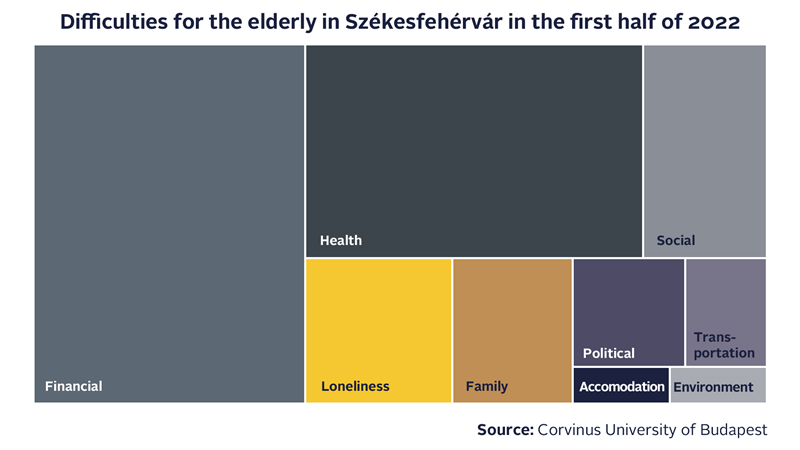Is it livelihood or health problems that weigh more heavily on older people?

In their survey, Corvinus researchers Éva Erika Révész, Miklós Rosta and Márton Tamás Katona were primarily interested in difficulties affecting the quality of life and public services, but they also examined what respondents thought about some of the key players, such as the state, local governments, civil society organisations ), families and workplaces. Half of the 176 respondents aged over 55 involved in the survey conducted in Székesfehérvár in the first half of 2022 mentioned financial problems first – low pensions, inflation –, followed by health condition and the deteriorating state of healthcare, and loneliness in third place. Family-related problems also weigh on the minds of elderly people. Seven percent of the respondents mentioned social problems as a cause for concern, mainly referring to the spreading of aggression, and conflicts in public life. Political factors where also found relevant, with respondents mentioning domestic and world political events. Environmental concerns were included in the top three factors only in very few cases.
Respondents thought that their families and local governments were the best placed to help solve their difficulties, mentioning the state last. In terms of who and which key players want to help them indeed, they mentioned families first, civil society organisations second and local governments third. The picture that emerged from the data is that respondents think that the state and local governments are not doing everything in their power to find solutions, while families and civil society organisations cannot do as much as they would like to. Interestingly, the members of civil society organisations are more critical of the state and local governments. The questionnaire also asked respondents about the public services they find the most important for older people. General practitioner care was in the first place (with 57% mentioning it), specialist medical care (24%) was in the second place, and culture (15%), including the libraries and theatres, in the third place.
The majority of elderly people say that their opinion is not heard
Elderly people were also asked about the extent to which they are consulted on issues that are important to them. “In the survey, 80 percent (!) of the elderly responded that their opinion is not sought, , and if it is, their view is not taken into account“, Éva Erika Révész, a lecturer at Corvinus, one of the leaders of the survey, said. “The higher a respondent’s level of education, the more important it is for them to be consulted,” she added.
When asked if they would like to work while in retirement, 65 percent of the respondents said no. Establishing social relationships is a very important motivation for both engaging in employment and voluntary work. The researchers mentioned that volunteering was also deemed to have an important role in offering opportunities for helping others, acquiring new knowledge and making new friends. According to the survey’s findings, the age group between 60 and 70 is the most active in voluntary work.
Women wish to develop in the area of digitalisation, while men want to develop in personal relationships
The survey also asked respondents about competencies they considered essential to be developed in future. The development of digital skills (mainly women finding it important) and personal relationships (more important for men) ranked first, and several respondents mentioned also the development of creativity, self-expression and thinking skills.
The results were presented under the title “Collaboration between Generations and the Well-Being of the Elderly in Székesfehérvár” at the Research Week of the Corvinus University of Budapest on 13 June by Éva Erika Révész, Assistant Professor at the Institute of Strategy and Management and Márton Tamás Katona, Assistant Lecturer at the Institute of Economics. Corvinus and the Civil Centrum Foundation started to collaborate on the topic as part of the WellOSyst programme in 2021, which is supported through the Alcoa Foundation by Alcoa, a local aluminium wheel rim manufacturing company. The aim is to improve the quality of life of the elderly and to strengthen social cohesion in Székesfehérvár – where around 20-25 thousand elderly people live –, by involving stakeholders, experts, civil society organisations working with the elderly and employers who employ pensioners. More than three quarters of the survey respondents were women, 80 percent had at least a general certificate from secondary education, 40 percent were over 70 years old and 30 percent were between 66 and 70 years old. “It is important that the data should not only be used for scientific analysis; we also want to make recommendations to the local community in the near future”, Éva Erika Révész said during the presentation.

